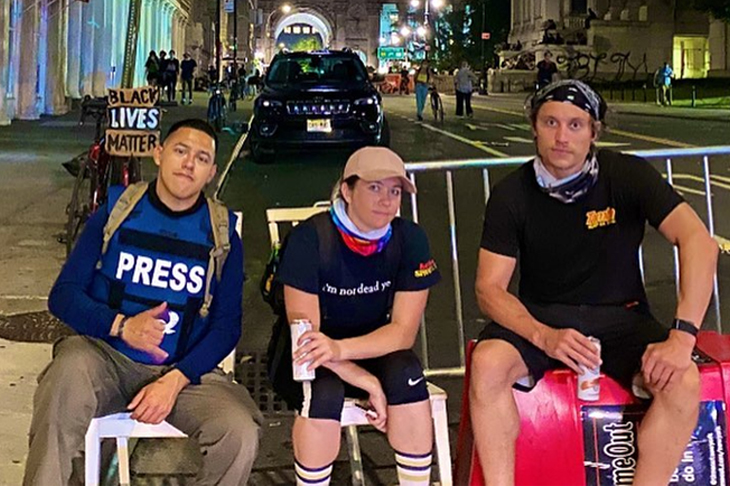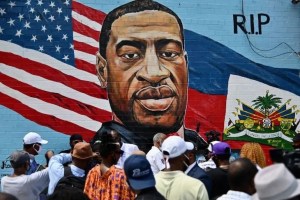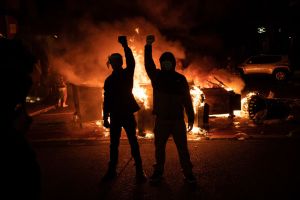Spare a thought for the joyless malcontents over at the Intercept, a website that once proudly defended journalists and fought government interference in the everyday lives of American citizens. Now the Intercept gleefully smears reporters who have dared to cover the protests-cum-riots of the past few years.
The site’s senior writer Robert Mackey and video producer Travis Mannion bothered to make a 25-minute-long video scrutinizing the coverage of ‘the Riot Squad’, a group of young journalists and videographers who film the violent aftermath of Black Lives Matter and antifa protests — among other riots. Some of these young reporters are, gasp, conservatives.
Cockburn couldn’t be bothered to watch the whole mini-documentary (seriously, must everything be a video these days?) but he did read the transcript below, which laid bare the supposed transgressions of the Daily Caller’s Richie McGinniss, Shelby Talcott and Jorge Ventura, Townhall’s Julio Rosas, BlazeTV’s Elijah Schaffer and independent reporters Kalen D’Almeida, Brendan Gutenschwager and Drew Hernandez. The story’s central allegation is that these eight people are ‘an informal club of right-wing video journalists who roam from city to city, feeding the conservative media’s hunger for images of destruction and violence on the margins of left-wing protests’.
That’s right. For the Intercept, the story isn’t the burning police car or the looted grocery store: it’s the young, ill-equipped and underpaid reporters who document it because the cable news channels can’t be bothered to. Cockburn wonders what’s going on inside Mackey’s head that lets him ignore how activists in Portland spent over 100 days trying to burn down a federal courthouse and instead dedicate his time to slavering over the Instagrams of journalists 20 years his junior (note: this is a guess, but he looks like he’s pushing 50.)
The most egregious allegation in the Intercept story concerns Richie McGinniss, who was on the scene when Kyle Rittenhouse shot two members of antifa in Kenosha, Wisconsin. Mackey talks about McGinniss’s proximity to the shooting and then floats this incredible theory:
‘Because McGinniss was just a few feet behind Rosenbaum when Rittenhouse opened fire and appeared to be filming, the fact that he released no video of the shooting that night led some observers to wonder if he, or the Daily Caller, might have decided to suppress or delete footage that could be used to convict the young right-wing vigilante.’
Note how on ‘some observers’ Mackey has chosen to link to a tweet with no likes or retweets, from an account with 75 followers, while he casually muses that a journalist might have helped cover up a homicide.
Naturally, McGinniss denies this. ‘@RobertMackey implies that I deleted footage to protect Kyle Rittenhouse (a felony) despite the fact that I told him my phone was NOT recording at the time of the shooting and that I turned over ALL footage to the police and cooperated FULLY on night of the shooting,’ he tweeted after the story’s release.
McGinniss was stunned by the Intercept story. ‘Despite speaking with Mackey for over an hour in order to set the record straight, he ignored almost all of my account and instead decided to select the bits of information that suited his narrative. Our team strives to do the opposite, which is to use the power of video to show the American public the full scope of how our political discourse plays out on the streets,’ he told Cockburn.
‘Shelby, Jorge and I have shown the good, the bad and the ugly without unnecessary commentary or editorialization. We let our reporting speak for itself. Bad journalism only inspires our team that much more to rise above.’
The other reporters mentioned were equally astonished at how Mackey had chosen to depict their work.
‘It’s disappointing that this is the “journalism” the Intercept is now apparently choosing to pursue, particularly when there are so many other legitimate issues that are consistently underreported or completely ignored,’ Shelby Talcott told Cockburn. ‘But it’s indicative of a much larger problem among the media these days: turning a blind eye to anything that may not fit a reporter’s preconceived narrative and then trying to tear down anyone who tells the truth.’
Julio Rosas took issue with how Mackey indicated that ‘the Riot Squad’ only sought out the violent aspects of the summer’s protests. ‘There were plenty of times when I noted that BLM protests were peaceful,’ Rosas told Cockburn. ‘It’s not my fault it was groups like BLM and antifa rioting for much of last year. I don’t care who riots. If I can cover a riot, I will.’
Glenn Greenwald, who cofounded the Intercept in 2014 and now runs a Substack, was unremitting in his criticism of his old site. ‘The Intercept is now actively targeting two journalists of color,’ he tweeted. ‘They have two white male reporters here putting a target on their backs for the crime of reporting on antifa riots. This is genuinely disgusting and dangerous. Press freedom groups should condemn this.’
And Greenwald wasn’t done there: ‘The Intercept has fallen into some sort of manic phase where their desperation to raise funds from a readership increasingly abandoning them — to avoid losing their 501(c)(3) status — is causing a level of recklessness & toxicity without limits.’
Cockburn doesn’t know too much about protest reporting — he attended one Black Lives Matter protest and spent the rest of last summer drinking to-go cocktails. Therefore he respects the likes of McGinniss, Talcott and Rosas, who walk the streets of burning cities, pointing their cameras as rioters destroy businesses and homes in communities of color. Mackey is right in one sense: most Americans wouldn’t see those things happening if the Riot Squad wasn’t there. Why on earth is he arguing that people shouldn’t?


















